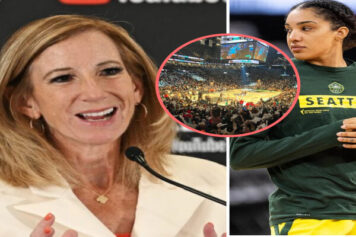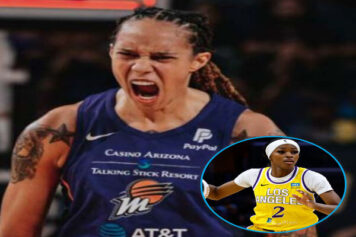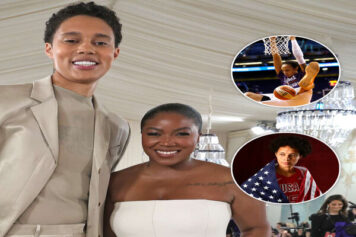The WNBA has been one of the global leaders in the women’s empowerment movement, championing everything from social justice, civil rights, women’s rights, LGBTQ rights and equal pay for women.
The League has presented itself as the premier women’s sports league that vigorously denounces crimes that are traditionally and perceptually perpetrated by men against women, such as domestic violence.
Lately, however, the league has had to deal with several domestic violence incidents involving its players that can potentially stain its pristine reputation. The WNBA has also been slow in dispensing punishment for these incidents.
Riquna Williams of the Los Angeles Sparks has been suspended without pay for ten games as a result of a domestic violence incident, the WNBA announced today on Tuesday.
Williams was arrested on April 29, 2019, and charged with two felony counts, one involving the assault of an individual with whom she was in a relationship and the other involving the threatening of another person with a firearm. Her criminal case is ongoing.
The WNBA is suspending Sparks guard Riquana Williams for 10 games
Statement from the league: pic.twitter.com/XNVrVpMQdf
— Matt Ellentuck (@mellentuck) July 16, 2019
The WNBA conducted its own internal investigation into this matter, including interviews of Williams and several witnesses. The League also consulted with a panel of experts in the field of domestic violence, upon whom the league relies in connection with such matters.
Based on the investigation, consultation, and a careful weighing of all the facts and circumstances, the WNBA determined that a ten-game suspension was appropriate. Among other factors, the WNBA took into account the nature and seriousness of the conduct at issue, including the involvement of a firearm. The WNBA will also require Williams to participate in counseling.
Still, the fact that Williams was allowed to continue to play as the investigation took place is head-scratching. The fact that none of the WNBA players spoke out against it is even more perplexing. It’s an uncomfortable truth that shows that male pro athletes alone don’t commit acts of domestic violence.
Williams’ suspension began with Thursday’s game against the Dallas Wings. The NFL has earned a reputation of ignoring women’s rights and being lax when inflicting punishment quick enough on players merely accused of domestic violence.
Williams was arrested, charged with multiple felonies and the league claims they couldn’t get in contact with her for several weeks to conduct an interview. If this was the NFL or NBA, they would be blasted for that inaction.
The WNBA has been trying to meet with Riquana Williams in person as part of its investigatory process for nearly two weeks. But they've yet to connect.
Why, you might ask? Because it might interrupt Williams' travel schedule with the Sparks, as she continues to play games! pic.twitter.com/wQ5P53vdps
— Don Hillary (@donhillarykc) July 14, 2019
To make matters worse, Williams’ gun-toting suspension comes on the heels of more domestic-abuse allegations levied against one of the League’s elite players, Storm All-Star forward Natasha Howard by her wife.
After letting the drama sit for a few days, late on Tuesday evening, Howard finally released her own statement through her attorney. She denied the allegations and noted that she has filed for divorce from her wife.
Furthermore, she said this would be her only statement on the matter in an effort to keep her focus on basketball.
Jacqueline Howard on Saturday morning posted videos and screenshots of text conversations with Natasha Howard and some Storm staff members, accusing Natasha of domestic abuse.
A WNBA spokesperson told The Shadow League, “We are aware of the situation involving Natasha Howard and are in the process of gathering additional information.”
To avoid a double standard, the WNBA needs to address this head-on. When male professional athletes are accused of domestic violence they are generally immediately suspended and torched in social media, innocent or not.
On Sunday, Howard played 24 minutes and had 14 points in Seattle’s 78-69 victory over the New York Liberty at Alaska Airlines Arena. Then she declined to comment through the team Saturday and was not made available to the media after the game Sunday.
These incidents have occurred back-to-back so the WNBA was forced to make a move. However, this is not the first time WNBA players have been the perpetrators of domestic violence.
Another notable incident of violence occurred in May 2015, involving Phoenix Mercury’s Brittney Griner and her then-partner, Glory Johnson of the Tulsa Shock (now the Dallas Wings). Both players were suspended, a record seven games after a domestic-violence incident in Arizona. Griner pleaded guilty to disorderly conduct, and Johnson accepted a plea deal.
WNBA suspends Brittney Griner, Glory Johnson 7 games for domestic violence arrest http://t.co/yDOSl7Y3Ib pic.twitter.com/hThXCdeECL
— Fox News (@FoxNews) May 16, 2015
“The WNBA takes all acts of violence extremely seriously,” then-league president, Laurel J. Richie said in 2015. “It is our strong belief that violence has absolutely no place in society, in sports or in this league … We recognize that our league has an obligation and an opportunity to set an example for people around the world, and we will continue doing everything we can to ensure that situations such as this do not happen again.”
In 2012 WNBA legend Chamique Holdsclaw was arrested for smashing the windows of her ex-lover and former teammate Jennifer Lacy’s car with a baseball bat and then firing a gun into the vehicle, police said.
That incident was basically explained away by using Holdsclaw’s compromised mental health as an explanation. She also didn’t have to do any time for that incident and is now celebrated as a hero and survivor of mental illness.
The language regarding personal conduct in the WNBA’s collective-bargaining agreement is vague. It states that “players shall at all times conform their conduct to standards of good citizenship, good moral character, and good sportsmanship and shall not do anything detrimental or prejudicial to the best interests of the WNBA, their teams, or the sport of basketball.”
The WNBA doesn’t have a perceived domestic violence problem, so of course, nobody criticized such incidents as they do incidents involving the Black men of the NFL. However, the WNBA’s dealing with two domestic violence situations as we speak, but nobody’s saying anything.
In light of recent incidents, it might be time for the WNBA to tighten up their domestic violence conduct policy as it seems they are not immune from such egregious behaviors and aren’t taking them very seriously when it involves their own.



